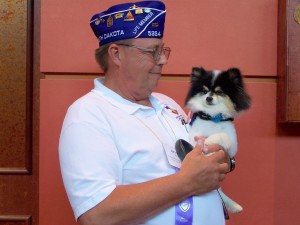Sep
1
Never Apart
Filed Under Dogs, Pets, PTSD treatment, Purple Heart
by Janet & Tony Seahorn
 It was a small, black & white, furry 5-pound bundle of emotional and physical relief. His name was Petie, the keeper of an adult warrior, Purple Heart, Vietnam Veteran.
It was a small, black & white, furry 5-pound bundle of emotional and physical relief. His name was Petie, the keeper of an adult warrior, Purple Heart, Vietnam Veteran.
The vet trained him as his first alert. An important task. Petie knew when his master needed to take his medications. He would wakeup Dennis at various times in the middle of the night so that specific pills were administered at the most critical time in order to keep the Post Traumatic Stress under control.
Dennis trained Petie especially for this purpose. They are best friends and constant companions, never apart. This small, furry medic is essential, not just for the vet’s physical well-being, but even more important, his emotional/mental stability.
Petie alerts Dennis when there is danger in the surroundings. He watches intently everything that goes on with his owner and around his owner. If Petie isn’t comfortable his master knows to pay closer attention to his current environment. If Petie doesn’t like you, more than likely Dennis isn’t going to become too friendly either.
They coexist, two different species, one functioning entity.
There are numerous organizations that train service dogs. Dogs that serve the deaf, blind, and epileptic individual. Dogs that act as the arms and legs of those who no longer have capacity to move on their own. Now, some of these groups are training dogs to do something even more challenging, knowing when their owner may go into a PTSD anxiety attack.
The dog must sense when such attacks may occur before they actually manifest themselves. They know even before the person that something is coming on – giving their owner an opportunity to breathe, use relaxation techniques, and take medication if necessary. They provide a sense of security and well-being in a world filled with unpredictability and potential stressors.
One such training organization is NEADS – Dogs for Deaf and Disabled Americans.
They are conducting an in-depth study of nine-ten Iraq vets who has severe PTSD. The study’s focus is to evaluate the most effective canine training methods that serve the sensitive needs of a veteran suffering from combat stress.
This is a very expensive and challenging research project because it must take into account the behaviors of two very different organisms: human and canine.
It will be a critical piece of information given the increasing number of individuals returning from the Iraq and Afghanistan theaters and those that have served in past wars such as Vietnam and the Gulf War.
Comments
One Response to “Never Apart”


Loved this entry! It’s so heartening to hear about man’s best friend helping those with PTSD.